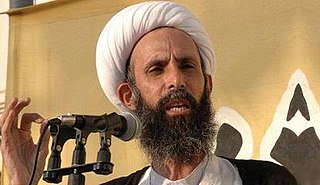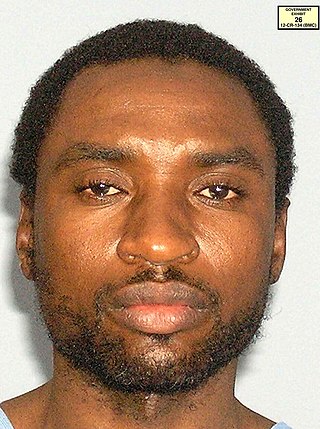| |||||
| Decades: | |||||
|---|---|---|---|---|---|
| See also: | Other events of 2014 History of Saudi Arabia | ||||
The following lists events in 2014 in Saudi Arabia .
| |||||
| Decades: | |||||
|---|---|---|---|---|---|
| See also: | Other events of 2014 History of Saudi Arabia | ||||
The following lists events in 2014 in Saudi Arabia .

Al-Qaeda is a Sunni pan-Islamist militant organization led by Salafi jihadists who self-identify as a vanguard spearheading a global Islamist revolution to unite the Muslim world under a supra-national Islamic state known as the Caliphate. Its members are mostly composed of Arabs, but also include other peoples. Al-Qaeda has mounted attacks on civilian and military targets in various countries, including the 1998 United States embassy bombings, the 2001 September 11 attacks, and the 2002 Bali bombings; it has been designated as a terrorist group by the United Nations Security Council, the North Atlantic Treaty Organization (NATO), the European Union, and various countries around the world.
State-sponsored terrorism is terrorist violence carried out with the active support of national governments provided to violent non-state actors. States can sponsor terrorist groups in several ways, including but not limited to funding terrorist organizations, providing training, supplying weapons, providing other logistical and intelligence assistance, and hosting groups within their borders. Because of the pejorative nature of the word, the identification of particular examples are often subject to political dispute and different definitions of terrorism.
On 29 May 2004, a Saturday, four men armed with guns and bombs attacked two oil industry installations and a residential compound, in Al-Khobar, Saudi Arabia—the hub of the Saudi oil industry. Over approximately 25 hours, the gunmen, describing themselves as members of "The Jerusalem Squadron" or "Jerusalem Brigade", killed 22 and injured 25, mainly third country national personnel working in Khobar.
Terrorism in Saudi Arabia has mainly been attributed to Islamic extremists. Their targets included foreign civilians—Westerners affiliated with its oil-based economy—as well as Saudi Arabian civilians and security forces. Anti-Western attacks have occurred in Saudi Arabia dating back to 1995. Saudi Arabia itself has been accused of funding terrorism in other countries, including Syria.

Salman bin Abdulaziz Al Saud is King of Saudi Arabia, reigning since 2015, and served as Prime Minister of Saudi Arabia. The 25th son of Ibn Saud, the founder of Saudi Arabia, he assumed the throne on 23 January 2015. Prior to his accession, he was Crown Prince of Saudi Arabia from 16 June 2012 to 23 January 2015. Salman is the 3rd oldest living head of state and the oldest living monarch.

The General Intelligence Presidency (GIP);, also known as the General Intelligence Directorate (GID), is the primary intelligence agency of the Kingdom of Saudi Arabia.
The following is a list of attacks which have been carried out by Al-Qaeda.

Hamza bin Osama bin Mohammed bin 'Awad bin Laden, better known as Hamza bin Laden, was a Saudi Arabian-born member of Al-Qaeda. He was a son of Al-Qaeda leader Osama bin Laden, and, following his father's death in 2011, he was described as an emerging leader within the group.

It is believed that members of Al-Qaeda are hiding along the border of Afghanistan and northwest sections of Pakistan. In Iraq, elements loosely associated with al-Qaeda, in the Jama'at al-Tawhid wal-Jihad organization commanded by Abu Musab al-Zarqawi, have played a key role in the War in Iraq.

Iran and Saudi Arabia have had no diplomatic relations following the attack on the Saudi embassy in Tehran in January 2016 after Saudi Arabia executed Sheikh Nimr al-Nimr, a Shia cleric. Bilateral relations between the countries have been strained over several geopolitical issues such as the interpretations of Islam, aspirations for leadership of the Islamic world, oil export policy and relations with the United States and other Western countries.

The Abdullah Azzam Brigades, or al-Qaeda in Lebanon, is a Sunni Islamist militant group, and al-Qaeda's branch in Lebanon. The group, which began operating in 2009, was founded by Saudi Saleh Al-Qaraawi and has networks in various countries, mainly in Egypt, Iraq, Syria, Jordan, the Gaza Strip and Lebanon.

Muhammad bin Nayef Al Saud, colloquially known by his initials MBN or MbN, is a former Saudi Arabian politician and businessman who served as the crown prince and first deputy prime minister of Saudi Arabia from 2015 to 2017 and as the minister of interior from 2012 to 2017.

Ayatollah Sheikh Nimr Baqir al-Nimr, commonly referred to as Sheikh Nimr, was a Shia sheikh in al-Awamiyah in Saudi Arabia's Eastern Province whose arrest and execution was widely condemned, including by governments and human rights organizations.
The Specialized Criminal Court (SCC) is a non-Sharia court created in Saudi Arabia in 2008 that tries suspected terrorists and human rights activists. On 26 June 2011, the court started trials of 85 people suspected of being involved in Al-Qaeda in the Arabian Peninsula and the 2003 Riyadh compound bombings and in September 2011 another 41 al-Qaeda suspects appeared in the court. In the same year, the court held trial sessions of human rights activists, including co-founder Mohammed Saleh al-Bejadi of the Saudi Civil and Political Rights Association (ACPRA) and Mubarak Zu'air, a lawyer for long-term prisoners, and Khaled al-Johani, who spoke to BBC Arabic Television at a protest in Riyadh, thus becoming known as "the bravest man in Saudi Arabia". The court convicted 16 of the human rights activists to sentences of 5–30 years' imprisonment on 22 November 2011.

The modern history of Saudi Arabia begins with the declaration of the unification of Saudi Arabia in a single kingdom in 1932. This period of time in Saudi Arabia's history includes the discovery of oil in Saudi Arabia and many invents. It goes on to encompass Saudi Arabia's brief involvement in World War II in 1945. Afterwards, it includes Saudi Arabia's involvement in the Western Bloc and the Cold War. It also includes Saudi Arabia's proxy conflict with Iran, the Arab Spring, and the ongoing Arab Winter.
The State of Israel has engaged in state-sponsored terrorism, and has been accused of committing acts of state terrorism on a daily basis in the Palestinian Occupied Territories. Countries that have condemned Israel's role as a perpetrator of state-sponsored terrorism or state terrorism include Bolivia, Iran, Lebanon, Saudi Arabia, Syria, Turkey, and Yemen.
Qatar has been accused of allowing terror financiers to operate within its borders, which has been one of the justifications for the Qatar diplomatic crisis that started in 2017 and ended in 2021. In 2014, David S. Cohen, then United States Under Secretary of the Treasury for Terrorism and Financial Intelligence, accused Qatari authorities of allowing financiers who were on international blacklists to live freely in the country: "There are U.S.- and UN-designated terrorist financiers in Qatar that have not been acted against under Qatari law." Accusations come from a wide variety of sources including intelligence reports, government officials, and journalists.
On January 2, 2016, the Kingdom of Saudi Arabia carried out a mass execution of 47 imprisoned civilians convicted for terrorism in 12 provinces in the country. Forty-three were beheaded and four were executed by firing squads. Among the 47 people killed was Shia Sheikh Nimr al-Nimr. The execution was the largest carried out in the kingdom since 1980. Nimr al-Nimr was sentenced to death by the Specialized Criminal Court on 15 October 2014 for "seeking 'foreign meddling' in Saudi Arabia, 'disobeying' its rulers and taking up arms against the security forces". His execution was condemned by religious and political figures and human rights groups. The Saudi government said the body would not be handed over to the family. Al-Nimr was very critical of the Saudi Arabian government, and called for free elections in Saudi Arabia.

Ibrahim Suleiman Adnan Adam Harun is a citizen of Niger who was convicted for his role in the death of two US soldiers, in 2003.
The 2017–2020 Qatif unrest was a phase of conflict in the Qatif region of Eastern Province, Saudi Arabia, between Saudi security forces and the local Shia community, that arose sporadically starting in 1979, including a series of protests and repression during the 2011–12 Saudi Arabian protests.